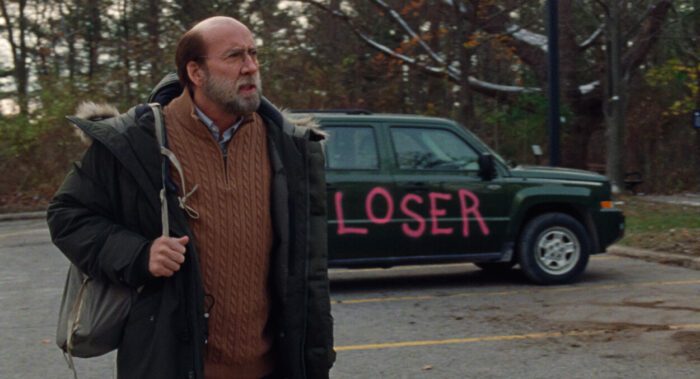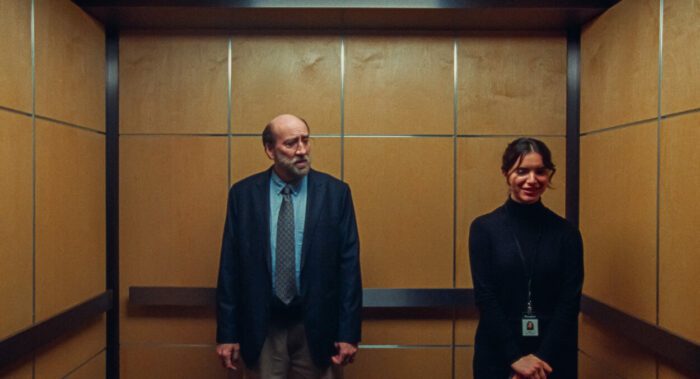Who doesn’t want to be famous? The ability to be recognized everywhere you go, and having an aura of importance around you sounds incredibly enticing. One thing about being famous in 2023 compared to, let’s say, 1993 is that it’s much harder to remain famous today than it ever was, especially if you’re a viral sensation. Fading into obscurity is worrisome but it might not be as scary as being canceled. You may remain famous, but at what cost? Kristoffer Borgli’s sharp and often funny satire Dream Scenario analyzes fame with an interesting twist: what if you had no hand in making yourself famous?
In Dream Scenario, Nicolas Cage plays a professor, Paul Matthews, who inexplicably starts appearing in people’s dreams all around the world. There’s nothing special about Paul. He doesn’t teach at an overly prestigious university, he isn’t making waves in his field of evolutionary biology, and is your standard average family man. Borgli isn’t interested in the why of it all, rather he takes us on a journey about the highs and lows of fame. You won’t find a scene where scientists are rushing to find an answer or long sequences where Paul is determined to figure out why he’s in everyone’s dreams.
And, it’s incredibly refreshing to see Borgli take this approach. If you think about it, the impetus of this sensation doesn’t matter. Mundane and talentless people like Paul become viral for the most inexplicable reasons, and we just accept that without any question. During the COVID-19 lockdown, many (now) household names became famous for making 30-second dances or simply living in a content house. As much as we—the public—have a hand in making people viral, we also have a big impact on if they stay relevant.

When Paul first becomes famous, he is on cloud nine. His extremely plain life gets hit with a ton of zest and everyone, from his students to news stations, want to talk to Paul. People who went out of their way to avoid Paul are now inviting him to their elite dinner parties. But, during this portion of the movie—which Borgli smartly keeps brief—Paul is a positive presence in everyone’s life. In the dreams, he isn’t doing any wrong. And, everyone wants to use Paul to their benefit.
We don’t appreciate famous people for inherently being famous—we appreciate them because they provide a service in our life. A singer gives us something to listen and an actor gives us something to watch. A chef gives us sustenance while an athlete provides us entertainment. If we encounter these people in life, we immediately want them to do their thing (“sing for us!” “say this line!” “make this dish!). Dream Scenario effectively shows Paul’s transition from boring professor to viral sensation to worldwide commodity, none more funny and uncomfortable than a long sequence between Paul and Molly (Dylan Gelula), an assistant at a viral marketing firm.
Just like everyone, Paul has been showing up in Molly’s dreams in a sexual manner and from the moment she locks eyes on to him, she wants to know if the dreams match up to real life. These are two people who, under normal circumstances, would never be together and, because of his virality, Paul is number one on Molly’s list. Without spoiling one of the most outrageous “sex” scenes of the years, Paul can’t live up to Molly’s lofty expectations. Borgli puts on a clinic with tone throughout the money, seamlessly going from straight comedy to dark comedy to cringe-worthy scenes. The tone constantly shifts, often multiple times in a scene, but you never feel whiplash and it feels convincing in this world.

After his encounter with Molly, Paul’s downfall begins. Soon, the dreams turn into nightmares and Paul becomes the latest victim to cancel culture. The best thing Borgli does in Dream Scenario is remaining truthful and committed to Paul’s character. At no point is Paul in control of his fame and, therefore, isn’t at fault over his cancellation. Some may interpret this as Borgli making a statement on the futility of cancel culture, but I don’t think he’s making a statement either way. I see it more as a snapshot of today’s culture where, once things aren’t of use to us anymore, we toss them away.
Even though Borgli has a command on tone, he has a hard time balancing the themes of commodity and cancel culture. Both ideas are present and give us a lot to think, but both are spread too thin. Either Borgli needed a longer run-time to cover both complex topics successfully or he should have focused on one aspect and made the whole movie about that. The ideas are there, the tone is there, the acting is there, it’s the execution that stumbles at times.
What doesn’t stumble is Dream Scenario’s style. Borgli is clearly inspired by Ari Aster (a producer on the film), Charlie Kaufman, Spike Jonze, even a little bit of David Lynch and it makes more such a kinetic viewing experience. The movie can go from being realistic to surreal, keeping your eyes wrapped on the screen. We see some truly horrifying nightmares during the portion where Paul is getting canceled and they evoke a visceral reaction. There’s some clever editing by Borgli himself where he splices in a second of a nightmare that I found fascinating and impactful.
Dream Scenario, ultimately, does not work without its lead star who is having one heck of a career resurgence. It doesn’t reach the highs of his career-best performance in Pig, but Cage is in top-form here. He gets to tap into his impeccable comedic skills and delivers some hearty laughs in addition to great physical comedy. But, it’s the way Cage makes you feel for him that makes this performance special. There’s empathy when Paul are incessantly mean to Paul when he starts getting canceled and, again, he really didn’t do anything to warrant it. Sure, some people aren’t able to separate nightmare Paul from real-life Paul, but everyone from random strangers to his own family can’t seem to be in the same room as him.

Cage shows Paul’s descent with despair and sadness. You can see the life slowly leave from Paul as his fame starts to turn into infamy. He was the happiest person at the beginning of his fame, however, Paul had no clue it would come at the cost of ruining his life. Cage shows all aspects of this journey with aplomb and I hope we keep getting Nicolas Cage in interesting roles that are challenging and thought-provoking.
The descent largely takes place in Dream Scenario’s third act, which will be polarizing for many. Subtlety is thrown out the window and Borgli uses the literal figures he’s satirizing to make his point about people and trauma becoming commodity. I found it to be amusing—to the point where I wished these ideas were expanded and covered more in depth—and compelling. Not to mention, these part of the movie is an absolute riot featuring some great cameos. The polarization extends to the ending of the movie, which I also didn’t mind but feel it may have been too ambiguous.
Even though the road has bumps along the way, Dream Scenario is never uninteresting, derivative, or bland. It’s inventive with multiple bold swings. Not all the choices work, but more work than not and it feels like the movie and Borgli have something to say. I felt challenged by this movie and have continued to think about it since I’ve seen it. Films like The Marvels (a fine 2.5 star movie) are frustrating because they’re giving you a rehashed product. It doesn’t feel special and has no purpose other than furthering the serialization of Marvel.
Movies need to have ideas. Movies need to have stakes. They need to challenge us as viewers and treat us like we’re smart. Dream Scenario is not a perfect movie, but it’s the type of movie that should exist consistently in our reality—not just in our dreams.



